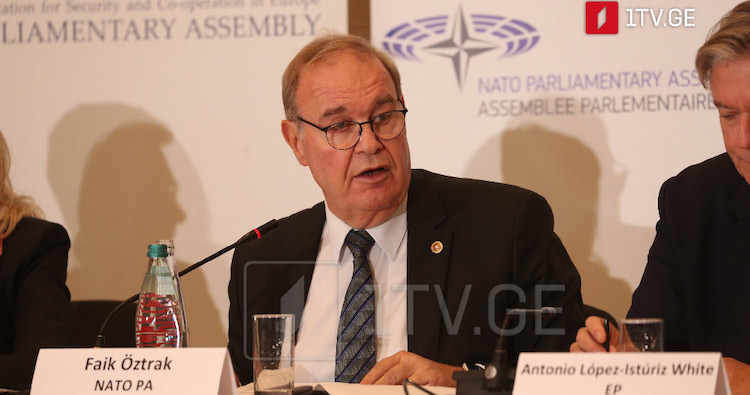NATO Parliamentary Assembly delegation Head expresses gratitude to Georgian authorities, citizens for support

Faik Öztrak, the Head of NATO’s Parliamentary Assembly delegation, on Sunday expressed gratitude to the Georgian authorities and citizens for their “significant support”, while also highlighting the importance of the Assembly's support for the Georgian people. Photo: 1TV
Faik Öztrak, the Head of NATO’s Parliamentary Assembly delegation, on Sunday expressed gratitude to the Georgian authorities and citizens for their “significant support”, while also highlighting the importance of the Assembly's support for the Georgian people.
The NATO Parliamentary Assembly operates separately from NATO itself. I am speaking on behalf of the Assembly. Our partnership with Georgia began 25 years ago and remains one of our most significant collaborations. Upholding common values such as individual freedoms, democracy, and the rule of law is essential for any country aspiring to join NATO. These principles are also vital for membership in the European Union”, he said.
Since the war in Ukraine began in February 2022, we have intensified our efforts to support Georgia. We recognise the country stands at a significant crossroads. We have publicly stated the Law on Transparency of Foreign Influence is a setback for the country’s democratic consolidation”, Öztrak added in reference to the controversial law adopted by the country’s Parliament in May.
This [parliamentary] election was another critical test for Georgia’s democracy, and its results will also serve as an important evaluation. Consequently, we decided to observe these elections. When we received the invitation, we accepted it, as we have been monitoring all elections in Georgia since 2008”, he added.
Speaking at a press briefing, Öztrak mentioned “several negative elements” witnessed during the elections. He specifically expressed concern about a “tense and deeply polarised environment, instances of voter intimidation and pressure outside polling stations, violations of voter secrecy, unequal conditions, and divisive rhetoric”.
He affirmed his commitment to reporting these observations to the Assembly for further review, to ensure a “renewed approach” to its relationship with the Georgian Parliament.
Öztrak reiterated the necessity of “supporting the Georgian people”. He said the country was encountering “significant challenges” in its pursuit of democratic reforms and consolidation.
He added the Assembly had “underscored the importance of establishing a centre for democratic resilience at NATO headquarters”, adding ”protecting democracy and making it a resource” for member countries as well as for Georgia was “vital”.
 Tweet
Tweet  Share
Share